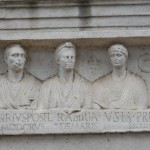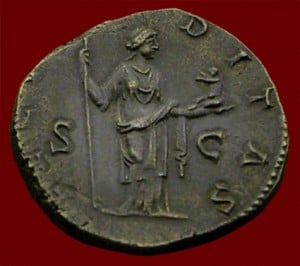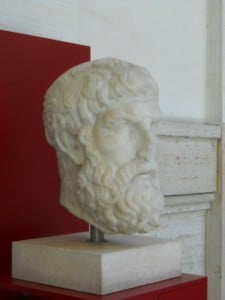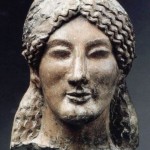Ave, ave, sanctissima Mater Ceres, te appello . . .
Every morning begins before the family lararium. An oil lamp or a candle is lit, incense is offered as Roman cultores stand to greet their ancestral Lares. Perhaps they had a dream in the night to discuss and seek advice on. Perhaps they discuss that day’s planned events. It is, each day, a very personal moment and a reminder, too, that we are always accompanied by our Lares. We end our prayers with a promise, “May everything I do and say this day bring honor and happiness on me, on my family, and on the Gods.”
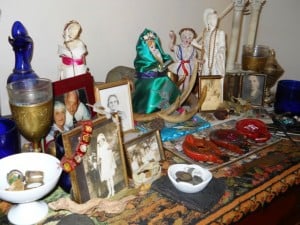
The first task for a new cultor Deorum is to establish a lararium. There is a process to it, in ritually cleansing the house and inviting your ancestors to visit your lararium. Usually it starts out simple. An image of the Lar familiaris or that of one’s Genius is flanked by two Lares offering food and drink. Oil lamps and candles, an incense holder, a bowl to receive libations or other offerings. Over the years the offerings can build. On the birthday of every family member, as one example, a pebble is added to the lararium and relics of various kinds may be stored there, as well as articles used in our rituals.
My own lararium has become quite cluttered over the years. At the center is a statue of my Lar familiaris who is Ceres Ferentina. She is adorned in garments, changed monthly for the seasons. Throughout the Fall and winter months she is dressed in black to mourn the loss of her daughter, Proserpina. In February her garments are changed to blue as the air begins to clear, in March they change to green for the opening of the seas, and so on through September when golden robes celebrate Ceres as a Goddess of the wheat harvest. Then in October when we celebrate Proserpina’s return to Dis Pater, Ceres puts aside her silks and is once more dressed in a simple cloth of black and offered poppy seeds to ease her loss. On either side of Ceres usually stand the household Penates, also known as Lares Augustales. Other statues may decorate the lararium as reminders. An image of Mars usually joins with the image of Ceres since Mars has had a major role in my life. Currently, too, is an image of Venus, invited to bring happiness and children into the family as we prepare for my son’s wedding later this month. She is therefore clothed and adorned in gold chains and a tiara, with seashells and a gold ring at her feet. There are several photos of deceased relatives and friends that I place in my lararium as these are my Lares. Portraits of my great grandparents are now among my Lares and to make them feel more at home I have placed a special kind of acorn and oak leaves, an Italian chestnut, along with juniper, laurel, and some stones which I brought back from Italy. I included topopungi, too, a curious plant of Italy not seen here in Ohio, which is used, it is said, by Italian fairies to protect their homes. Its name means “mouse stingers” due to its leaves curled into cones like pointed spears. A portrait of three of my grandparents likewise have herbs, stones, and wood returned from Italy. My mother’s portrait, too, has lavender and laurel from Italy and a bracelet of angels from Livia who accompanied me in Europe. Many of the stones and herbs I include in my lararium are significant to me because of where they were found, but also because of what they are. In both cases this refers to the numina they possess. There are other kinds of relics whose numina are more from who has touched them then from their material or their location. There are coins from ancient Rome, all of which have been given to me by friends, so that their numina are in the coins along with the numina of all the ancient Romans through whose hands they circulated. There are coins, too, of every place in which I ever travelled. Deer horns, not usually associated with Ceres, are from my son, commemorating his first hunt. There is a cobalt blue glass jug for water collected from nearby rivers. A bronze knife sits in front, as no iron is allowed in the presence of Ceres. There are three oil lamps, all gifts from friends, and several candle holders and candles, small cups, bowls and other implements, incense burners, and rings, which are removed and placed at the lararium whenever one dines. Lunaria stones, counting our years, are stored in nearby jars. Other stones, naturally pierced, and found items are shared with the Lares as well. But, for everything else that may be placed in the lararium, the most important element is the pallum stone that serves as a cenotaph to receive the spirits of the Lares when they visit. Mine is a green stone with three orange bands, representing family members above, below and here.
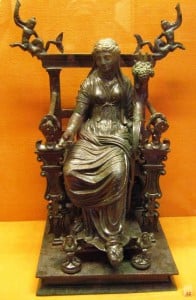
Most modern cultores today include a meditation along with their morning prayers. I am in the habit of randomly opening Virgil’s Aeneid or else I’ll look at the meditations of Marcus Aurelius or Epictetus’ Handbook. Today’s oracle, four phrases drawn randomly from the Aeneid, gave:
“Tumbled from the car, that headlong fall, in showers, her worship and her household gods, these take.”
That may refer to the fact that my wife’s pickup truck is still in the garage for a realignment, and a reminder to pray to the Lares, our household gods, to protect us when we go to pick it up later today.
For today’s meditation I looked at passages from the Stoic Epictetus. “The philosophers say that we must first learn there is a God . . . (next) what the Gods are like; for in accordance with whatever nature They are discovered to have, the person who is going to please Them and obey Them must endeavor to resemble Them to the utmost of his capacity. If the deity is faithful, then he too must be faithful; if free, beneficent, and high-minded, then he too must be free, beneficent, and high-minded; and generally, in all his words and actions, act in imitation of a God (Discourse 2.14.11-13).”
This goes along with another discourse by Epictetus where he discussed personal adornment. He said that if we admire a man’s sense of justice, his temperate manner, and his self-control, we ought to emulate those qualities that we admire in him. “Then, if you make yourself over into such a man, you can be assured that you will make yourself beautiful (3.1.8-9).” The Epicurean Philodemus had a similar view. He spoke about the powerful Gods all being equal and all being self-sufficient, and yet choose to live together in friendship. In his book On Piety Philodemus said that by meditating on the Gods in Their happiness and virtue, it helps us to become as much like the Gods as possible (Bk II). It is a good meditative thought, one that we are reminded every day in our final prayer.
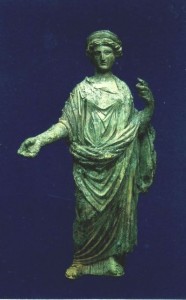
We are reminded in our daily worship that our Lares are ever present, always watching our every action and all we say (or write or text). And since we think of our Lares as our ancestors, we always treat them as though they were our grandparents, which they are. Would I do this or that in front of my grandparents, or say something that I know would hurt them? Or shall I temper my words and deeds, to bring honor and happiness to the memory of my ancestors? Sometimes this is a more tangible idea to think of your grandparents and great grandparents standing beside you, protecting you and admonishing you, than to think solely of higher Gods watching your every move. Surely Sol sees everything under the sun, and Luna will shine in the night sky over all that lies beneath Her. Father Jupiter by day and Summanus by night watches over us. Mercury watches over travelers, and thus will observe our driving. Neptune, not the most tranquil of Gods, shall be on guard for our anger, Venus shall guide our love, Nerio, wife of Mars, will temper our rashness as She will Her husband’s. You can meditate on the higher Gods, as Philodemus advised, but when it really comes down to it, who restrains our bad emotions and who promotes our best behavior are our parents, grandparents, and great grandparents, our Lares. This is why we begin each day addressing our Lares, greet them whenever we leave home, greet them upon our return, offer to share our main meal with them, and end the day in their company before the lararium.
Each night a candle is lit. Its flickering light reveals the Lares as they watch over us in our sleep. And in our last wakeful moments, bringing us full circle from our morning prayers to promote family honor and happiness that day, we recall the exercise which Epictetus advised (Discourses 3.10.2).
Let not sleep approach thy weary eyes,
Ere every action of this day,
Thou dost strictly and righteously survey:
What have I done? In what have I transgressed?
What good or ill has this day’s life expressed?

